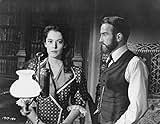A Vienne, en 1885, les recherches de Freud sur l'inconscient de ses malades et le sien propre l'amènent à ses principales découvertes et à un scandale qui ébranlera toute la médecine viennoi... Tout lireA Vienne, en 1885, les recherches de Freud sur l'inconscient de ses malades et le sien propre l'amènent à ses principales découvertes et à un scandale qui ébranlera toute la médecine viennoise.A Vienne, en 1885, les recherches de Freud sur l'inconscient de ses malades et le sien propre l'amènent à ses principales découvertes et à un scandale qui ébranlera toute la médecine viennoise.
- Réalisation
- Scénario
- Casting principal
- Nommé pour 2 Oscars
- 9 nominations au total
- Herr Jacob Koertner
- (as Joseph Furst)
- Student Doctor
- (non crédité)
- Dr. Guber
- (non crédité)
- Wilkie, Student in Paris
- (non crédité)
Avis à la une
The opening and closing narration (by Huston) is effective, though the occasional narration he does as the story progresses bothered me a little; it was as if they felt there was something missing from the film which had to be explained in voiceover, and it also pulled me out of the story momentarily. Probably it would have been more effective if Clift (rather than Huston) had done the narration, from Freud's point of view, in the body of the film.
The film, which maintains a serious, fiercely somber atmosphere throughout (similar to The Elephant Man though perhaps more so here), does not proceed with any real speed - you'll need to stay with it; and the dark, harsh style of photography and music (while effective) might be difficult for some viewers. You need not agree with Freud's concluding theories (many of which are not held in particularly high regard today) in order to recognize the importance and validity of his primary methods and pioneering work in what was then a highly ridiculed field. 8 of 10
which is a pity. It is much better than "The Young Freud" which has
recently been showing on PBS. It captures in some depth the
creativity and uniqueness of Freud's early discoveries, which were
amplified by him and others throughout the 20th century and into
the 21st. We see him doggedly and devotedly looking for the root
causes of a psychological illness which masqueraded as a
physical (neurological) illness for centuries. His discoveries,
stemming from this time, have greatly influenced modern thinking,
such that we call our times "The Age of Anxiety." They have led to
the appreciation of childhood sexuality and abuse and have taken
psychological abuse out from under the carpet, where these
pivotal events have been hidden for centuries. Freud was able to
see the classic appeal of the Greek tragedies and interpret why
they retain their power and are performed today, 3000 years later!
Le saviez-vous
- AnecdotesJean-Paul Sartre wrote the original script at the request of director John Huston, but it was unused as it was too long. Many key elements from Jean-Paul Sartre's script survive in the finished film, such as the creation of the composite patient Cecily, who combines features of Freud's patients Anna O., Elisabeth von R., Dora, and others. After Sartre's death, his screenplay was published separately as "The Freud Scenario."
- Citations
Narrator: Since ancient times there have been three great changes in man's idea of himself. Three major blows dealt us in our vanity. Before Copernicus, we thought we were the centre of the universe, that all the heavenly bodies revolved around our Earth. But the great astronomer shattered that conceit and we were forced to admit our planet is but one of many which swing around the sun, that there are other systems beyond our solar system in myriad worlds. Before Charles Darwin man believed he was a species unto himself separate and apart from the animal kingdom. But the great biologist made us see that our physical organism is the product of a vast evolutionary process whose laws are no different for us than for any other form of animal life. Before Sigmund Freud, man believed that what he said and did were the products of his conscious will alone. But the great psychologist demonstrate the existence of another part of our mind, which functions in darkest secrecy and can even rule our lives. This is the story of Freud's descent into a region almost as black as hell itself: Man's unconscious, and how he let in the light.
- Versions alternativesOriginally prepared at 140 minutes; cut to 120 minutes for theatrical release. Some older TV prints still use the cut version; full-length version is now available on DVD in the UK (as of 2015 there has been no domestic Region 1 DVD release.)
- ConnexionsFeatured in Discovering Huston (2012)
Meilleurs choix
- How long is Freud?Alimenté par Alexa
Détails
Box-office
- Budget
- 4 000 000 $US (estimé)
- Montant brut mondial
- 6 388 $US
- Durée2 heures 20 minutes
- Couleur
- Rapport de forme
- 1.85 : 1
Contribuer à cette page





































